Commercial Law Assignment - Contract Law: Case Analysis and Remedies
VerifiedAdded on 2023/04/26
|5
|1296
|486
Homework Assignment
AI Summary
This Commercial Law assignment analyzes a case involving the sale of an antique chair, focusing on contract formation, breach, and remedies. The assignment examines the elements of a valid contract, including offer, acceptance, and consideration, and assesses whether an enforceable agreement exists between the parties. It explores issues of misrepresentation and duress, determining their impact on the contract's validity. The assignment further addresses the principle of frustration of contract, considering the destruction of the chair by fire and its implications for the parties' obligations. Finally, it evaluates the remedies available to the parties, including specific performance and damages, based on the breach of contract and the validity of the termination of the original contract.
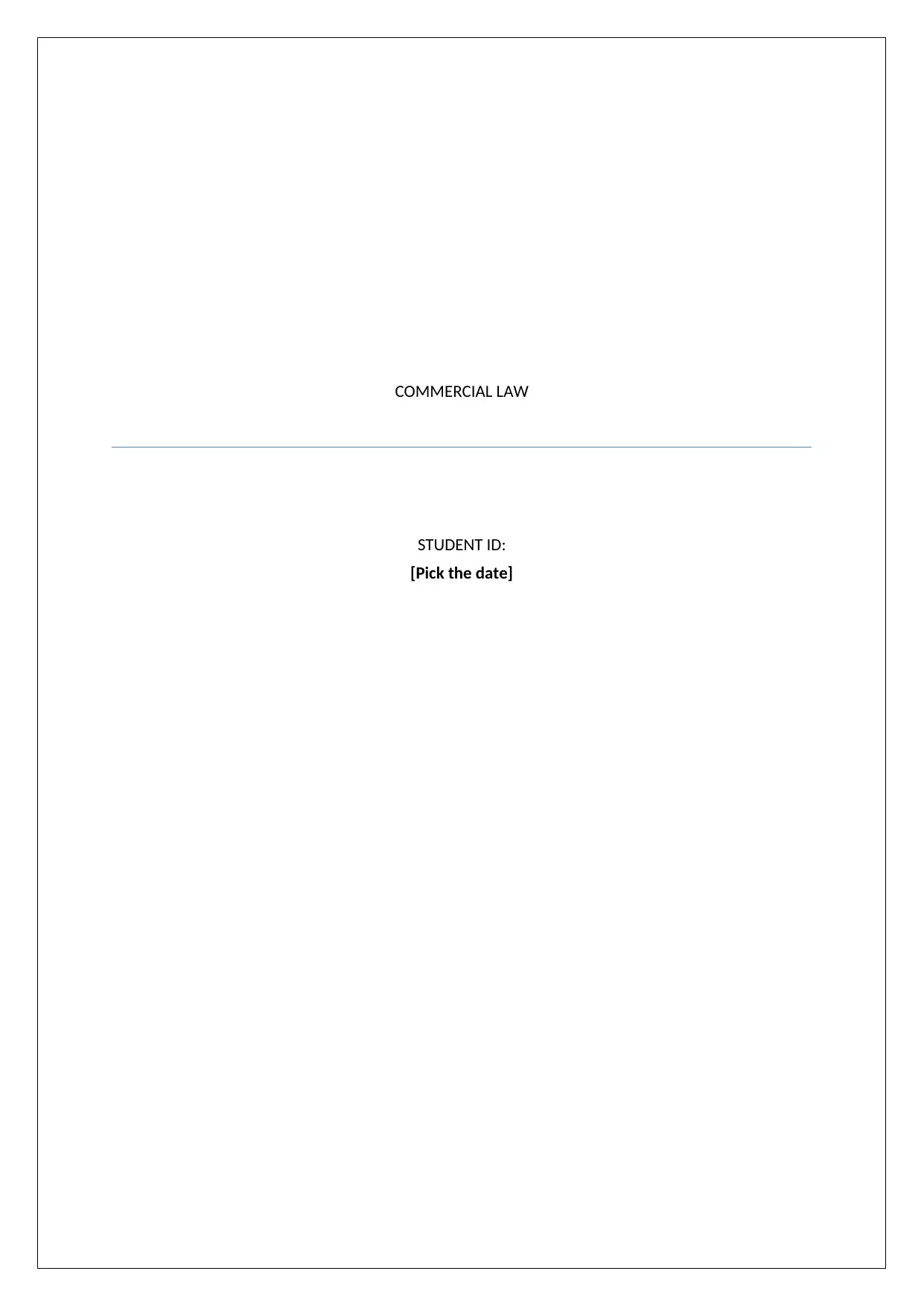
COMMERCIAL LAW
STUDENT ID:
[Pick the date]
STUDENT ID:
[Pick the date]
Paraphrase This Document
Need a fresh take? Get an instant paraphrase of this document with our AI Paraphraser
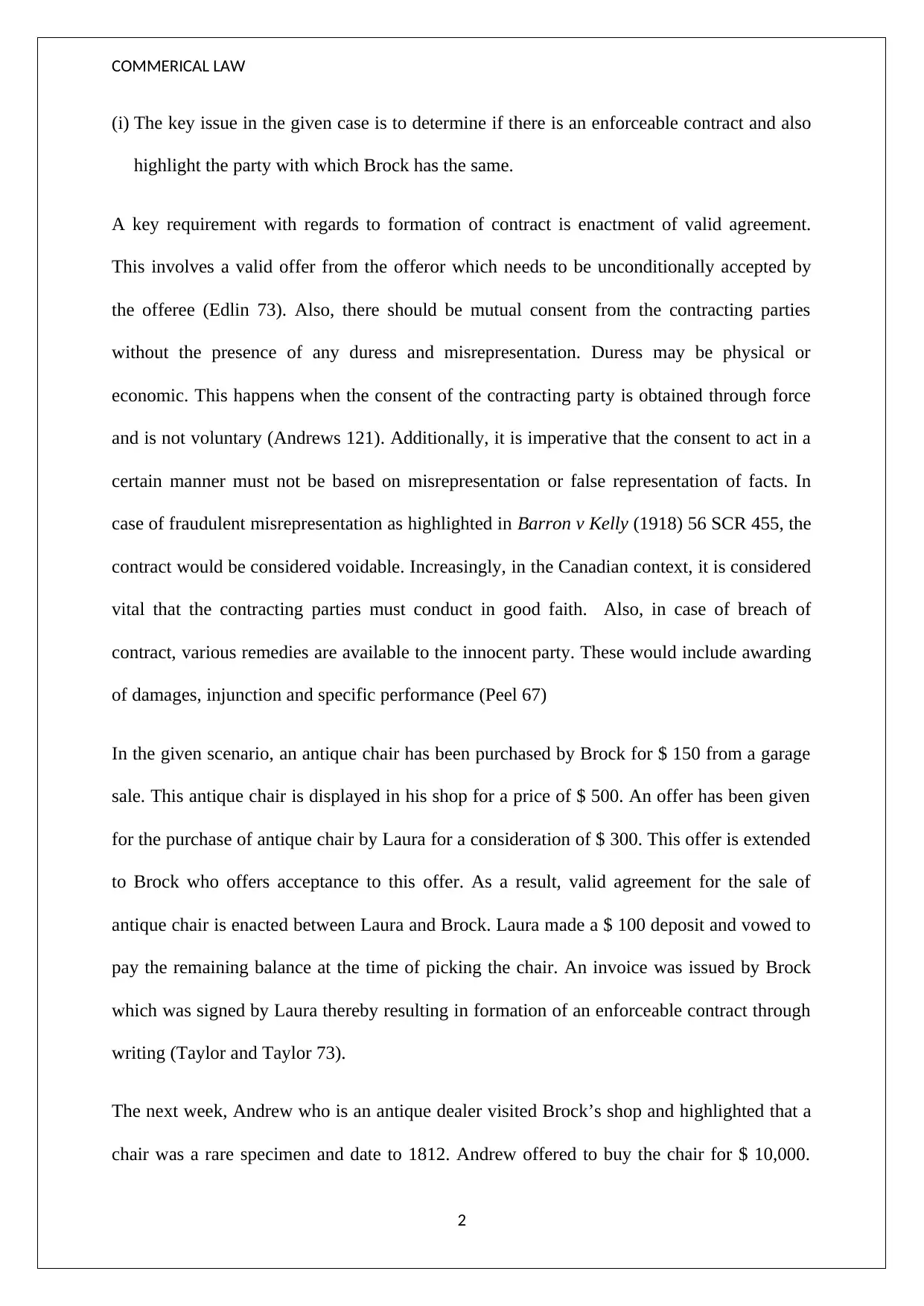
COMMERICAL LAW
(i) The key issue in the given case is to determine if there is an enforceable contract and also
highlight the party with which Brock has the same.
A key requirement with regards to formation of contract is enactment of valid agreement.
This involves a valid offer from the offeror which needs to be unconditionally accepted by
the offeree (Edlin 73). Also, there should be mutual consent from the contracting parties
without the presence of any duress and misrepresentation. Duress may be physical or
economic. This happens when the consent of the contracting party is obtained through force
and is not voluntary (Andrews 121). Additionally, it is imperative that the consent to act in a
certain manner must not be based on misrepresentation or false representation of facts. In
case of fraudulent misrepresentation as highlighted in Barron v Kelly (1918) 56 SCR 455, the
contract would be considered voidable. Increasingly, in the Canadian context, it is considered
vital that the contracting parties must conduct in good faith. Also, in case of breach of
contract, various remedies are available to the innocent party. These would include awarding
of damages, injunction and specific performance (Peel 67)
In the given scenario, an antique chair has been purchased by Brock for $ 150 from a garage
sale. This antique chair is displayed in his shop for a price of $ 500. An offer has been given
for the purchase of antique chair by Laura for a consideration of $ 300. This offer is extended
to Brock who offers acceptance to this offer. As a result, valid agreement for the sale of
antique chair is enacted between Laura and Brock. Laura made a $ 100 deposit and vowed to
pay the remaining balance at the time of picking the chair. An invoice was issued by Brock
which was signed by Laura thereby resulting in formation of an enforceable contract through
writing (Taylor and Taylor 73).
The next week, Andrew who is an antique dealer visited Brock’s shop and highlighted that a
chair was a rare specimen and date to 1812. Andrew offered to buy the chair for $ 10,000.
2
(i) The key issue in the given case is to determine if there is an enforceable contract and also
highlight the party with which Brock has the same.
A key requirement with regards to formation of contract is enactment of valid agreement.
This involves a valid offer from the offeror which needs to be unconditionally accepted by
the offeree (Edlin 73). Also, there should be mutual consent from the contracting parties
without the presence of any duress and misrepresentation. Duress may be physical or
economic. This happens when the consent of the contracting party is obtained through force
and is not voluntary (Andrews 121). Additionally, it is imperative that the consent to act in a
certain manner must not be based on misrepresentation or false representation of facts. In
case of fraudulent misrepresentation as highlighted in Barron v Kelly (1918) 56 SCR 455, the
contract would be considered voidable. Increasingly, in the Canadian context, it is considered
vital that the contracting parties must conduct in good faith. Also, in case of breach of
contract, various remedies are available to the innocent party. These would include awarding
of damages, injunction and specific performance (Peel 67)
In the given scenario, an antique chair has been purchased by Brock for $ 150 from a garage
sale. This antique chair is displayed in his shop for a price of $ 500. An offer has been given
for the purchase of antique chair by Laura for a consideration of $ 300. This offer is extended
to Brock who offers acceptance to this offer. As a result, valid agreement for the sale of
antique chair is enacted between Laura and Brock. Laura made a $ 100 deposit and vowed to
pay the remaining balance at the time of picking the chair. An invoice was issued by Brock
which was signed by Laura thereby resulting in formation of an enforceable contract through
writing (Taylor and Taylor 73).
The next week, Andrew who is an antique dealer visited Brock’s shop and highlighted that a
chair was a rare specimen and date to 1812. Andrew offered to buy the chair for $ 10,000.
2
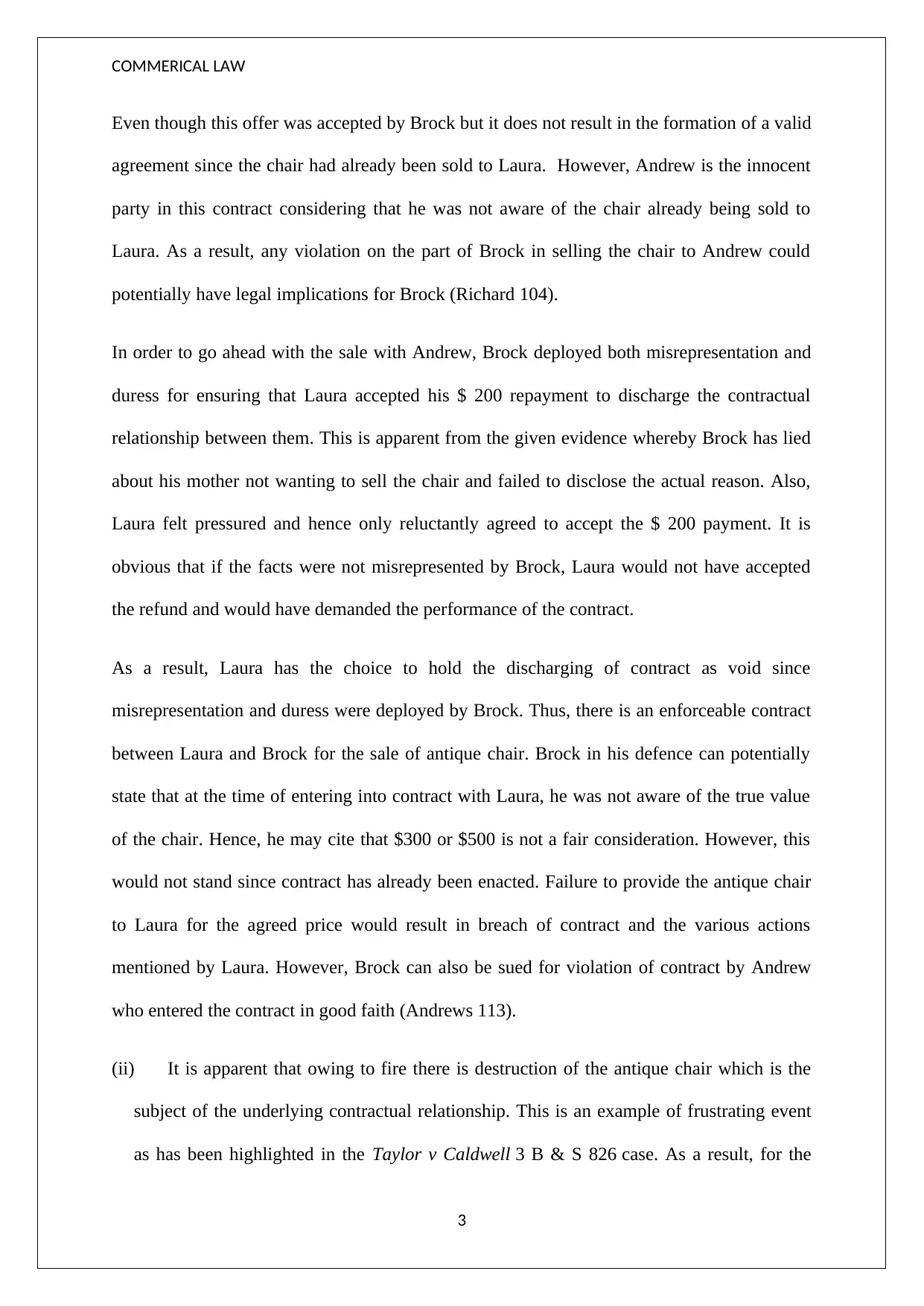
COMMERICAL LAW
Even though this offer was accepted by Brock but it does not result in the formation of a valid
agreement since the chair had already been sold to Laura. However, Andrew is the innocent
party in this contract considering that he was not aware of the chair already being sold to
Laura. As a result, any violation on the part of Brock in selling the chair to Andrew could
potentially have legal implications for Brock (Richard 104).
In order to go ahead with the sale with Andrew, Brock deployed both misrepresentation and
duress for ensuring that Laura accepted his $ 200 repayment to discharge the contractual
relationship between them. This is apparent from the given evidence whereby Brock has lied
about his mother not wanting to sell the chair and failed to disclose the actual reason. Also,
Laura felt pressured and hence only reluctantly agreed to accept the $ 200 payment. It is
obvious that if the facts were not misrepresented by Brock, Laura would not have accepted
the refund and would have demanded the performance of the contract.
As a result, Laura has the choice to hold the discharging of contract as void since
misrepresentation and duress were deployed by Brock. Thus, there is an enforceable contract
between Laura and Brock for the sale of antique chair. Brock in his defence can potentially
state that at the time of entering into contract with Laura, he was not aware of the true value
of the chair. Hence, he may cite that $300 or $500 is not a fair consideration. However, this
would not stand since contract has already been enacted. Failure to provide the antique chair
to Laura for the agreed price would result in breach of contract and the various actions
mentioned by Laura. However, Brock can also be sued for violation of contract by Andrew
who entered the contract in good faith (Andrews 113).
(ii) It is apparent that owing to fire there is destruction of the antique chair which is the
subject of the underlying contractual relationship. This is an example of frustrating event
as has been highlighted in the Taylor v Caldwell 3 B & S 826 case. As a result, for the
3
Even though this offer was accepted by Brock but it does not result in the formation of a valid
agreement since the chair had already been sold to Laura. However, Andrew is the innocent
party in this contract considering that he was not aware of the chair already being sold to
Laura. As a result, any violation on the part of Brock in selling the chair to Andrew could
potentially have legal implications for Brock (Richard 104).
In order to go ahead with the sale with Andrew, Brock deployed both misrepresentation and
duress for ensuring that Laura accepted his $ 200 repayment to discharge the contractual
relationship between them. This is apparent from the given evidence whereby Brock has lied
about his mother not wanting to sell the chair and failed to disclose the actual reason. Also,
Laura felt pressured and hence only reluctantly agreed to accept the $ 200 payment. It is
obvious that if the facts were not misrepresented by Brock, Laura would not have accepted
the refund and would have demanded the performance of the contract.
As a result, Laura has the choice to hold the discharging of contract as void since
misrepresentation and duress were deployed by Brock. Thus, there is an enforceable contract
between Laura and Brock for the sale of antique chair. Brock in his defence can potentially
state that at the time of entering into contract with Laura, he was not aware of the true value
of the chair. Hence, he may cite that $300 or $500 is not a fair consideration. However, this
would not stand since contract has already been enacted. Failure to provide the antique chair
to Laura for the agreed price would result in breach of contract and the various actions
mentioned by Laura. However, Brock can also be sued for violation of contract by Andrew
who entered the contract in good faith (Andrews 113).
(ii) It is apparent that owing to fire there is destruction of the antique chair which is the
subject of the underlying contractual relationship. This is an example of frustrating event
as has been highlighted in the Taylor v Caldwell 3 B & S 826 case. As a result, for the
3
⊘ This is a preview!⊘
Do you want full access?
Subscribe today to unlock all pages.

Trusted by 1+ million students worldwide
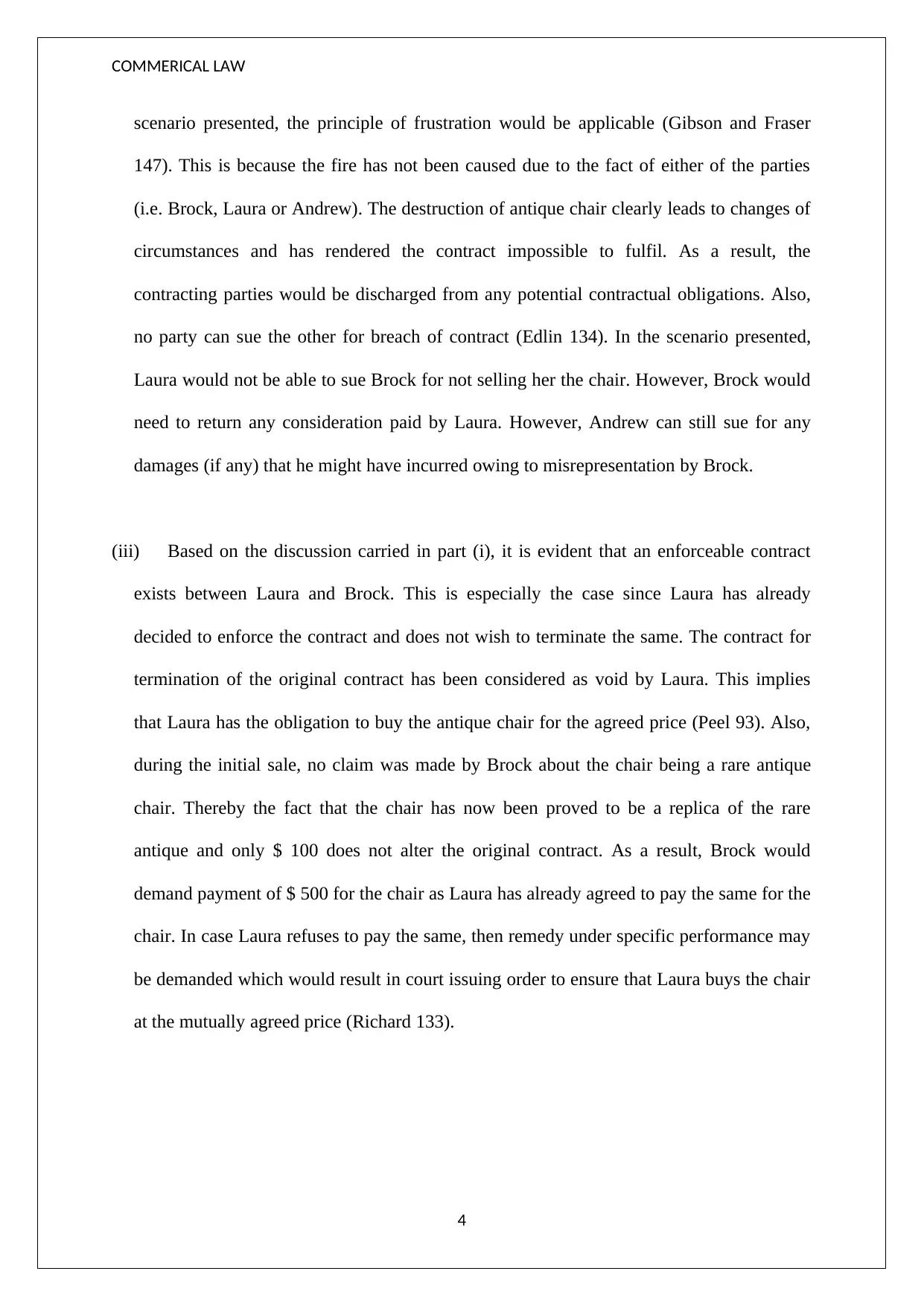
COMMERICAL LAW
scenario presented, the principle of frustration would be applicable (Gibson and Fraser
147). This is because the fire has not been caused due to the fact of either of the parties
(i.e. Brock, Laura or Andrew). The destruction of antique chair clearly leads to changes of
circumstances and has rendered the contract impossible to fulfil. As a result, the
contracting parties would be discharged from any potential contractual obligations. Also,
no party can sue the other for breach of contract (Edlin 134). In the scenario presented,
Laura would not be able to sue Brock for not selling her the chair. However, Brock would
need to return any consideration paid by Laura. However, Andrew can still sue for any
damages (if any) that he might have incurred owing to misrepresentation by Brock.
(iii) Based on the discussion carried in part (i), it is evident that an enforceable contract
exists between Laura and Brock. This is especially the case since Laura has already
decided to enforce the contract and does not wish to terminate the same. The contract for
termination of the original contract has been considered as void by Laura. This implies
that Laura has the obligation to buy the antique chair for the agreed price (Peel 93). Also,
during the initial sale, no claim was made by Brock about the chair being a rare antique
chair. Thereby the fact that the chair has now been proved to be a replica of the rare
antique and only $ 100 does not alter the original contract. As a result, Brock would
demand payment of $ 500 for the chair as Laura has already agreed to pay the same for the
chair. In case Laura refuses to pay the same, then remedy under specific performance may
be demanded which would result in court issuing order to ensure that Laura buys the chair
at the mutually agreed price (Richard 133).
4
scenario presented, the principle of frustration would be applicable (Gibson and Fraser
147). This is because the fire has not been caused due to the fact of either of the parties
(i.e. Brock, Laura or Andrew). The destruction of antique chair clearly leads to changes of
circumstances and has rendered the contract impossible to fulfil. As a result, the
contracting parties would be discharged from any potential contractual obligations. Also,
no party can sue the other for breach of contract (Edlin 134). In the scenario presented,
Laura would not be able to sue Brock for not selling her the chair. However, Brock would
need to return any consideration paid by Laura. However, Andrew can still sue for any
damages (if any) that he might have incurred owing to misrepresentation by Brock.
(iii) Based on the discussion carried in part (i), it is evident that an enforceable contract
exists between Laura and Brock. This is especially the case since Laura has already
decided to enforce the contract and does not wish to terminate the same. The contract for
termination of the original contract has been considered as void by Laura. This implies
that Laura has the obligation to buy the antique chair for the agreed price (Peel 93). Also,
during the initial sale, no claim was made by Brock about the chair being a rare antique
chair. Thereby the fact that the chair has now been proved to be a replica of the rare
antique and only $ 100 does not alter the original contract. As a result, Brock would
demand payment of $ 500 for the chair as Laura has already agreed to pay the same for the
chair. In case Laura refuses to pay the same, then remedy under specific performance may
be demanded which would result in court issuing order to ensure that Laura buys the chair
at the mutually agreed price (Richard 133).
4
Paraphrase This Document
Need a fresh take? Get an instant paraphrase of this document with our AI Paraphraser
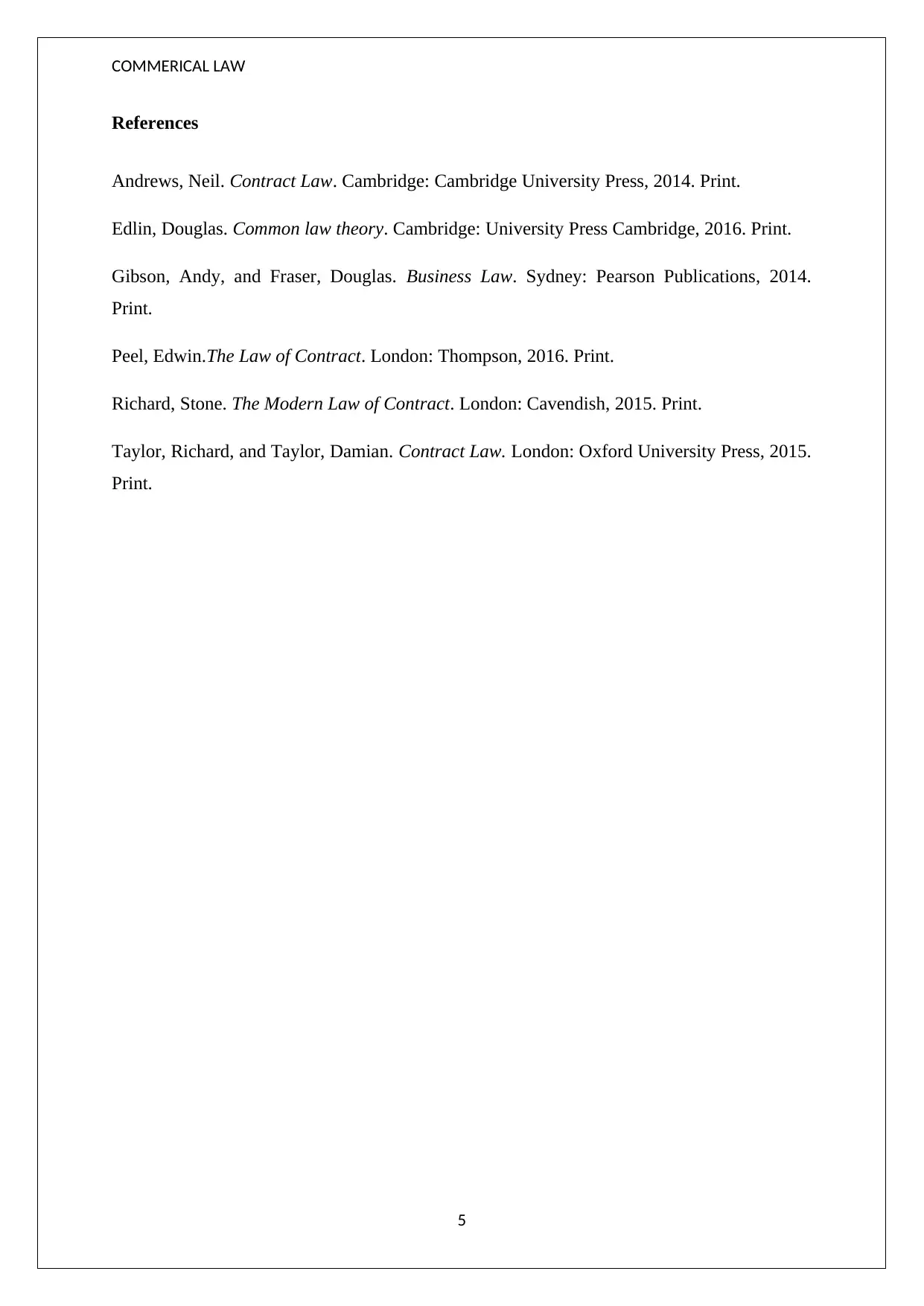
COMMERICAL LAW
References
Andrews, Neil. Contract Law. Cambridge: Cambridge University Press, 2014. Print.
Edlin, Douglas. Common law theory. Cambridge: University Press Cambridge, 2016. Print.
Gibson, Andy, and Fraser, Douglas. Business Law. Sydney: Pearson Publications, 2014.
Print.
Peel, Edwin.The Law of Contract. London: Thompson, 2016. Print.
Richard, Stone. The Modern Law of Contract. London: Cavendish, 2015. Print.
Taylor, Richard, and Taylor, Damian. Contract Law. London: Oxford University Press, 2015.
Print.
5
References
Andrews, Neil. Contract Law. Cambridge: Cambridge University Press, 2014. Print.
Edlin, Douglas. Common law theory. Cambridge: University Press Cambridge, 2016. Print.
Gibson, Andy, and Fraser, Douglas. Business Law. Sydney: Pearson Publications, 2014.
Print.
Peel, Edwin.The Law of Contract. London: Thompson, 2016. Print.
Richard, Stone. The Modern Law of Contract. London: Cavendish, 2015. Print.
Taylor, Richard, and Taylor, Damian. Contract Law. London: Oxford University Press, 2015.
Print.
5
1 out of 5
Related Documents
Your All-in-One AI-Powered Toolkit for Academic Success.
+13062052269
info@desklib.com
Available 24*7 on WhatsApp / Email
![[object Object]](/_next/static/media/star-bottom.7253800d.svg)
Unlock your academic potential
Copyright © 2020–2026 A2Z Services. All Rights Reserved. Developed and managed by ZUCOL.




